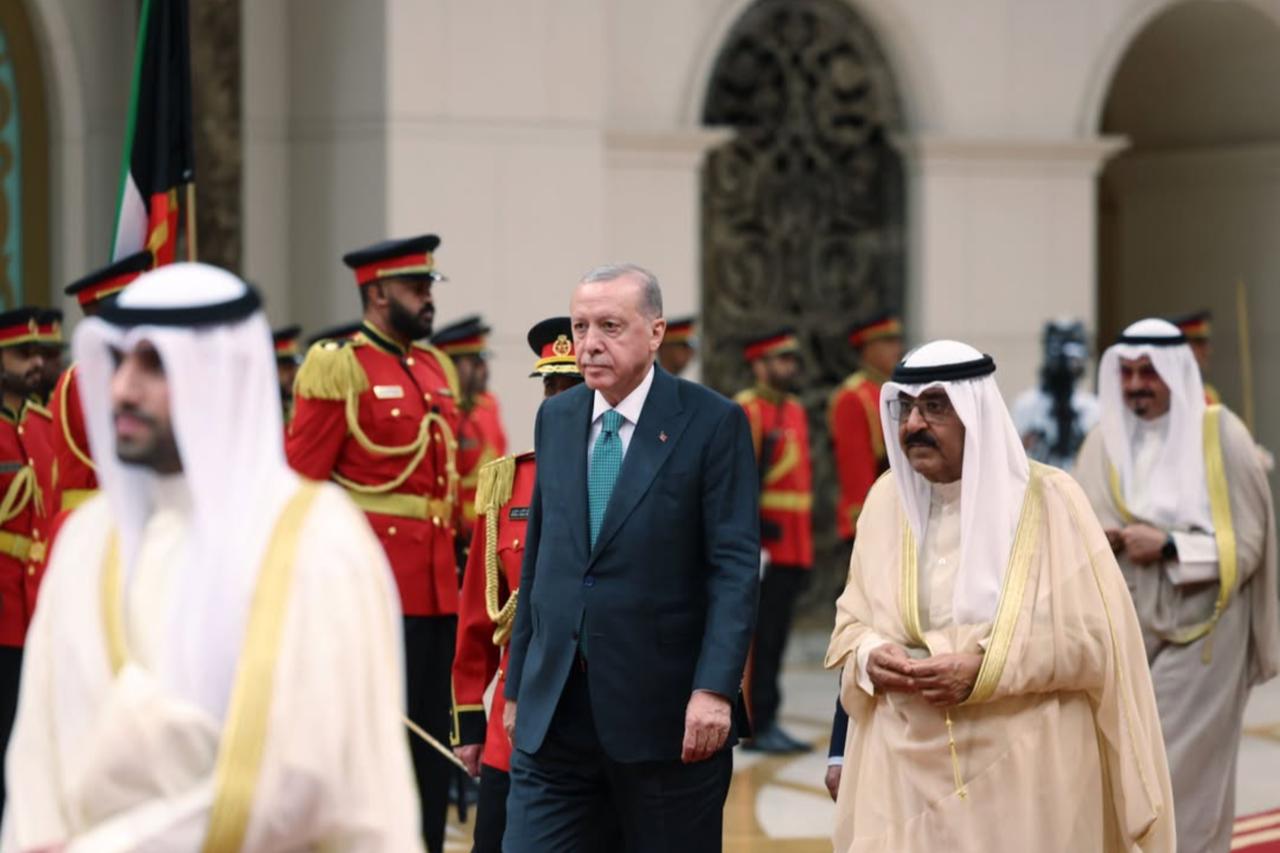
President Recep Tayyip Erdogan arrived in Kuwait on Oct. 21 to a warm welcome from Emir Sheikh Mishal Al-Ahmad Al-Jaber Al-Sabah.
Given the current regional context shaped by the crises in Gaza and the ongoing transformation in Syria, strengthening the strategic partnership between Türkiye and Kuwait within a shared regional vision holds great significance—both for the advancement of bilateral relations and for a broader perspective of peace in the Middle East.
Türkiye–Kuwait relations have followed a positive momentum, yet the current level of cooperation remains below their full potential.
Before addressing the potential agenda of the visit, it is useful to briefly revisit the history of relations between the two countries.
As in the cases of Saudi Arabia and Qatar, Kuwait and Türkiye have long maintained strong diplomatic ties. Political bonds that date back to the Ottoman period deepened through diplomatic and commercial cooperation from the 1970s onward.
The two countries signed agreements on cultural relations and aviation partnership in 1975 and 1977, economic, technical, and industrial cooperation in 1982, and the promotion and protection of investments in 1988.
The legacy of Türkiye’s support during the 1991 Iraqi invasion remains deeply embedded in Kuwait’s collective memory and continues to shape perceptions among both the public and policymakers.
Under the Justice and Development Party’s (AK Party) renewed foreign policy focus on deepening ties with Middle Eastern states, Türkiye and Kuwait concluded memoranda of understanding in 2008 and 2014 covering a broad spectrum of areas, including military cooperation, joint exercises and training, maritime transport, natural resource conservation, and industrial exports.
In the post-2011 regional order shaped by the Arab Uprisings, Türkiye and Kuwait have maintained a convergent vision concerning the Middle East’s political trajectory.
Both states actively supported reform initiatives and assumed mediating roles in the civil wars and conflicts that proliferated across the region.
The swift expression of solidarity by the late Emir Sheikh Sabah Al-Ahmad Al-Jaber Al-Sabah during the 2016 coup attempt in Türkiye exemplified this close political alignment.
Following his accession in December 2023, Kuwait’s Emir Sheikh Mishal Al-Ahmad Al-Jaber Al-Sabah made his first official visit outside the Arab world to Ankara in May 2024.
The visit was particularly significant as it coincided with the 60th anniversary of Türkiye–Kuwait diplomatic relations and marked the first visit by a Kuwaiti Emir to Türkiye in seven years.
During the meetings, six agreements were concluded in the areas of defense, diplomacy, and trade, alongside a memorandum of understanding to establish a strategic dialogue mechanism.
These initiatives aim to enhance high-level cooperation in fields such as investment promotion, free economic zones, housing, infrastructure, and disaster and emergency management.
Notably, a government-to-government (G2G) defense industry agreement emerged as one of the central outcomes of the visit.
In 2018, the two countries signed a plan to enhance defense cooperation, resembling Türkiye’s strategic partnership framework with Qatar. The most prominent example of this growing coordination is Kuwait’s $367 million contract with Baykar in 2023 for the acquisition of TB2 unmanned aerial vehicles (UAVs).
Earlier, in 2016, Türkiye delivered forty Ejder (armored personnel carriers) to Kuwait. Between 2019 and 2023, Türkiye ranked as the world’s eleventh-largest arms exporter, while Kuwait was among the top twelve arms importers—highlighting the significant potential for further deepening defense ties at both bilateral and regional levels.
The adoption of a “government-to-government” (G2G) agreement model constitutes a critical institutional dimension of the Türkiye–Kuwait defense partnership—an arrangement Türkiye has implemented with only a limited number of states.
Functioning in a manner comparable to the U.S. Foreign Military Sales (FMS) mechanism, the G2G framework positions Türkiye as a long-term supplier and strategic partner in Kuwait’s defense modernization efforts.
G2G agreements hold strategic importance for the future of defense cooperation and the broader Türkiye–Kuwait relationship in three key respects.
First, this model reflects a foundation of institutionalized trust between the two states and a shared commitment to sustain it, as Turkish authorities are granted the mandate to oversee procurement and defense projects on behalf of Kuwait.
Nonetheless, Turkish systems currently constitute only a modest portion of Kuwait’s overall defense expenditures—a situation likely to change only if the G2G mechanism is fully operationalized and Turkish defense products gain competitive preference.
Second, although not yet fully implemented, the model signifies the gradual embedding of Türkiye’s defense expertise and project management capabilities within Gulf security architectures.
The increasing visibility of Turkish defense know-how in the region could, in turn, influence the Gulf’s evolving balance of power. The geopolitical leverage Türkiye has consolidated through its military presence in Qatar may, through such institutionalized arrangements, extend to a wider regional scope.
Finally, G2G agreements embody trust-based and security-integrated frameworks that can serve as transformative platforms for regional defense partnerships—potentially marking a pivotal moment in the trajectory of Türkiye–Kuwait relations.
Kuwaiti foreign policy expert Dr. Tahani Al-Terkait of Durham University emphasizes that Türkiye–Kuwait ties have maintained resilience and stability despite regional shifts and domestic political changes, reflecting the steady continuation of diplomatic stability even when priorities differ.
Al-Terkait further highlights that both countries converge on a shared platform for regional peace and stability:
“This visit and the growing cooperation efforts in recent years reflect a positive momentum in regional collaboration.”
In sum, Türkiye–Kuwait relations have the potential to evolve into a higher-level partnership encompassing economic, political, and defense industry cooperation.
This, however, requires sustained diplomatic commitment from both sides. Transforming the Israel-centric (in)security paradigm of the Middle East and moving toward multiple hegemonic formations will only be possible through such constructive and trust-based collaborations.
Ultimately, the bilateral and transformative initiatives emerging from the Global South constitute the most powerful instruments for challenging the U.S.- and Israel-centered status quo—and within this context, Kuwait– Türkiye relations stand as a critical example.